| Listing 1 - 10 of 22 | << page >> |
Sort by
|
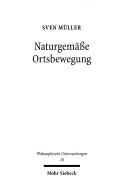
ISBN: 3161490088 9783161490088 Year: 2006 Volume: 16 Publisher: Tübingen Mohr Siebeck
Abstract | Keywords | Export | Availability | Bookmark
 Loading...
Loading...Choose an application
- Reference Manager
- EndNote
- RefWorks (Direct export to RefWorks)
Motion --- Science, Medieval --- Medieval science --- Kinetics --- Dynamics --- Physics --- Kinematics --- Aristotle. --- Aristotle --- Aristoteles --- Aristote --- Aristotile --- Aristoteles. --- Influence. --- Arisṭāṭṭil --- Aristo, --- Aristotel --- Aristotele --- Aristóteles, --- Aristòtil --- Arisṭū --- Arisṭūṭālīs --- Arisutoteresu --- Arystoteles --- Ya-li-shih-to-te --- Ya-li-ssu-to-te --- Yalishiduode --- Yalisiduode --- Ἀριστοτέλης --- Αριστοτέλης --- Аристотел --- ארסטו --- אריםטו --- אריסטו --- אריסטוטלס --- אריסטוטלוס --- אריסטוטליס --- أرسطاطاليس --- أرسططاليس --- أرسطو --- أرسطوطالس --- أرسطوطاليس --- ابن رشد --- اريسطو --- Pseudo Aristotele --- Pseudo-Aristotle --- アリストテレス
Book
ISBN: 3631554443 Year: 2006 Volume: 11 Publisher: Frankfurt am Main New York Peter Lang
Abstract | Keywords | Export | Availability | Bookmark
 Loading...
Loading...Choose an application
- Reference Manager
- EndNote
- RefWorks (Direct export to RefWorks)
Aristotle. --- Aristotle --- Aristoteles --- Aristote --- Aristotile --- Criticism and interpretation --- Early works to 1800. --- Translations into Old High German. --- Arisṭāṭṭil --- Aristo, --- Aristotel --- Aristotele --- Aristóteles, --- Aristòtil --- Arisṭū --- Arisṭūṭālīs --- Arisutoteresu --- Arystoteles --- Ya-li-shih-to-te --- Ya-li-ssu-to-te --- Yalishiduode --- Yalisiduode --- Ἀριστοτέλης --- Αριστοτέλης --- Аристотел --- ארסטו --- אריםטו --- אריסטו --- אריסטוטלס --- אריסטוטלוס --- אריסטוטליס --- أرسطاطاليس --- أرسططاليس --- أرسطو --- أرسطوطالس --- أرسطوطاليس --- ابن رشد --- اريسطو --- Pseudo Aristotele --- Pseudo-Aristotle --- アリストテレス
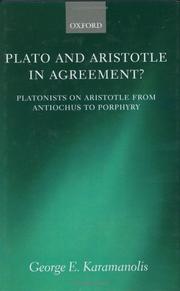
ISBN: 0199264562 9780199264568 0191603996 0199684634 9786612268137 0191532630 1282268139 1423768132 9780199684632 Year: 2006 Volume: *10 Publisher: Oxford : Clarendon press,
Abstract | Keywords | Export | Availability | Bookmark
 Loading...
Loading...Choose an application
- Reference Manager
- EndNote
- RefWorks (Direct export to RefWorks)
George Karamanolis breaks new ground in the study of later ancient philosophy by examining the interplay of the two main schools of thought, Platonism and Aristotelianism, from the first century BC to the third century AD. From the time of Antiochus and for the next four centuries Platonists were strongly preoccupied with the question of how Aristotle's philosophy compared with the Platonic model. Scholars have usually classified Platonists into two groups, the orthodox ones and the eclectics or syncretists, depending on whether Platonists rejected Aristotle's philosophy as a whole or accepted some Peripatetic doctrines. Karamanolis argues against this dichotomy. He argues that Platonists turned to Aristotle only in order to discover and elucidate Plato's doctrines and thus to reconstruct Plato's philosophy, and they did not hesitate to criticize Aristotle when judging him to be at odds with Plato. For them, Aristotle was merely auxlilary to their accessing and understanding Plato. Platonists were guided in their judgement about Aristotle's proximity to, or distance from, Plato by their own assumptions about what Plato's doctrines were. Also crucial for their judgement were their views about which philosophical issues particularly mattered. Given the diversity of views rehearsed in Plato's works, Platonists were flexible enough to decide which were Plato's own doctrines. The real reason behind the rejection of Aristotle's testimony was not to defend the purity of Plato's philosophy, as Platonists sometimes argued in a rhetorical fashion. Aristotle's testimony was rejected, rather, because Platonists assumed that Plato's doctrines were views found in Plato's work which Aristotle had discarded or criticized. The evaluation of Aristotle's testimony on the part of the Platonists also depends on their interpretation of Aristotle himself. This is particularly clear in the case of Porphyry, with whom the ancient discussion reaches a conclusion which most later Platonists accepted. While essentially in agreement with Plotinus's interpretation of Plato, Porphyry interpreted Aristotle in such a way that the latter appeared to agree essentially with Plato on all significant philosophical questions, a view which was dominant until the Renaissance. Karamanolis argues that Porphyry's view of Aristotle's philosophy guided him to become the first Platonist to write commentaries on Aristotle's works.
Platonists. --- Platoniciens --- Aristotle. --- Platonists --- Platonism --- Philosophers --- Philosophy, Ancient --- Aristoteles --- Aristote --- Aristotle --- Aristotile --- Aristoteles. --- Arisṭāṭṭil --- Aristo, --- Aristotel --- Aristotele --- Aristóteles, --- Aristòtil --- Arisṭū --- Arisṭūṭālīs --- Arisutoteresu --- Arystoteles --- Ya-li-shih-to-te --- Ya-li-ssu-to-te --- Yalishiduode --- Yalisiduode --- Ἀριστοτέλης --- Αριστοτέλης --- Аристотел --- ארסטו --- אריםטו --- אריסטו --- אריסטוטלס --- אריסטוטלוס --- אריסטוטליס --- أرسطاطاليس --- أرسططاليس --- أرسطو --- أرسطوطالس --- أرسطوطاليس --- ابن رشد --- اريسطو --- Pseudo Aristotele --- Pseudo-Aristotle --- アリストテレス --- Plato
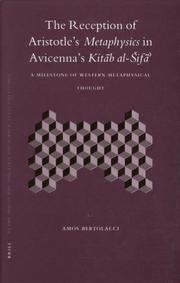
ISBN: 900414899X 9786611397005 1281397008 9047408713 9789004148994 9789047408710 Year: 2006 Volume: 63 Publisher: Leiden Boston Brill
Abstract | Keywords | Export | Availability | Bookmark
 Loading...
Loading...Choose an application
- Reference Manager
- EndNote
- RefWorks (Direct export to RefWorks)
This volume deals with the reception of Aristotle's Metaphysic s in the masterpiece on metaphysics by Avicenna (Ibn Sīnā, d. 1037 C.E.), one of the major exponents of Arabic philosophy: the Ilāhiyyāt (Science of Divine Things) of the Kitāb al-Šifā' ( Book of the Cure ), known in the Latin Middle Ages as Liber de Philosophia Prima sive Scientia Divina. The first part of the book (on the Arabic translations of the Metaphysics , al-Kindī and al-Fārābī) introduces the discussion of Avicenna's reshaping of the epistemological profile of the Metaphysics in Part II (his account of the subject-matter, structure, method and role of metaphysics in the system of sciences) and the recasting of its contents in Part III. The present volume provides the first systematic comparison of the Ilāhiyyāt with the Metaphysics and a comprehensive account of this latter's transmission in pre-Avicennian Greek and Arabic philosophy.
Islamic philosophy --- Metaphysics --- Greek influences --- History --- Aristote --- Aristotle. --- Avicenna, --- Aristoteles. --- Aristoteles --- Aristotle --- Aristotile --- Influence. --- Arisṭāṭṭil --- Aristo, --- Aristotel --- Aristotele --- Aristóteles, --- Aristòtil --- Arisṭū --- Arisṭūṭālīs --- Arisutoteresu --- Arystoteles --- Ya-li-shih-to-te --- Ya-li-ssu-to-te --- Yalishiduode --- Yalisiduode --- Ἀριστοτέλης --- Αριστοτέλης --- Аристотел --- ארסטו --- אריםטו --- אריסטו --- אריסטוטלס --- אריסטוטלוס --- אריסטוטליס --- أرسطاطاليس --- أرسططاليس --- أرسطو --- أرسطوطالس --- أرسطوطاليس --- ابن رشد --- اريسطو --- Pseudo Aristotele --- Pseudo-Aristotle --- アリストテレス --- History. --- Islamic philosophy - Greek influences --- Metaphysics - History --- Avicenna, - 980-1037. - Ilahiyat --- Aristotle. - Metaphysics --- Aristote - Influence --- Greek influences.
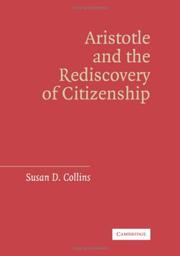
ISBN: 0521860466 9780521860468 0511225776 9780511225772 9780511226342 0511226349 0511224486 9780511224485 0511225156 9780511225154 1107167639 1280541512 0511498632 0511317867 0521110211 9780511498633 9780521110211 Year: 2006 Publisher: New York, NY Cambridge University Press
Abstract | Keywords | Export | Availability | Bookmark
 Loading...
Loading...Choose an application
- Reference Manager
- EndNote
- RefWorks (Direct export to RefWorks)
Aristotle and the Rediscovery of Citizenship confronts a question that is central to Aristotle's political philosophy as well as to contemporary political theory: what is a citizen? Answers prove to be elusive, in part because late twentieth-century critiques of the Enlightenment called into doubt fundamental tenets that once guided us. Engaging the two major works of Aristotle's political philosophy, his Nicomachean Ethics and his Politics, Susan D. Collins poses questions that current discussions of liberal citizenship do not adequately address. Drawing a path from contemporary disputes to Aristotle, she examines in detail his complex presentations of moral virtue, civic education, and law; his view of the aims and limits of the political community; and his treatment of the connection between citizenship and the human good. Collins thereby shows how Aristotle continues to be an indispensable source of enlightenment, as he has been for political and religious traditions of the past.
Citizenship --- Philosophy. --- Aristotle --- Political and social views. --- Philosophy --- Aristoteles --- Aristote --- Aristotile --- Arisṭāṭṭil --- Aristo, --- Aristotel --- Aristotele --- Aristóteles, --- Aristòtil --- Arisṭū --- Arisṭūṭālīs --- Arisutoteresu --- Arystoteles --- Ya-li-shih-to-te --- Ya-li-ssu-to-te --- Yalishiduode --- Yalisiduode --- Ἀριστοτέλης --- Αριστοτέλης --- Аристотел --- ארסטו --- אריםטו --- אריסטו --- אריסטוטלס --- אריסטוטלוס --- אריסטוטליס --- أرسطاطاليس --- أرسططاليس --- أرسطو --- أرسطوطالس --- أرسطوطاليس --- ابن رشد --- اريسطو --- Pseudo Aristotele --- Pseudo-Aristotle --- アリストテレス --- Political philosophy. Social philosophy --- Arts and Humanities --- Citizenship - Philosophy. --- Aristotle - Political and social views.

ISBN: 3826034430 9783826034435 Year: 2006 Publisher: Würzburg: Königshausen und Neumann,
Abstract | Keywords | Export | Availability | Bookmark
 Loading...
Loading...Choose an application
- Reference Manager
- EndNote
- RefWorks (Direct export to RefWorks)
Ethics --- Philosophy of nature --- Aristotle --- Nature --- Nature, Philosophy of --- Natural theology --- Deontology --- Ethics, Primitive --- Ethology --- Moral philosophy --- Morality --- Morals --- Philosophy, Moral --- Science, Moral --- Philosophy --- Values --- Aristotle. --- Aristoteles --- Aristote --- Aristotile --- Aristoteles. --- Arisṭāṭṭil --- Aristo, --- Aristotel --- Aristotele --- Aristóteles, --- Aristòtil --- Arisṭū --- Arisṭūṭālīs --- Arisutoteresu --- Arystoteles --- Ya-li-shih-to-te --- Ya-li-ssu-to-te --- Yalishiduode --- Yalisiduode --- Ἀριστοτέλης --- Αριστοτέλης --- Аристотел --- ארסטו --- אריםטו --- אריסטו --- אריסטוטלס --- אריסטוטלוס --- אריסטוטליס --- أرسطاطاليس --- أرسططاليس --- أرسطو --- أرسطوطالس --- أرسطوطاليس --- ابن رشد --- اريسطو --- Pseudo Aristotele --- Pseudo-Aristotle --- アリストテレス
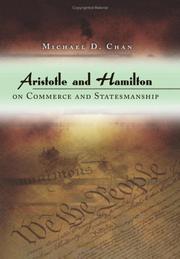
ISBN: 0826216390 0826265162 9780826265166 9780826216397 Year: 2006 Publisher: Columbia University of Missouri Press
Abstract | Keywords | Export | Availability | Bookmark
 Loading...
Loading...Choose an application
- Reference Manager
- EndNote
- RefWorks (Direct export to RefWorks)
"Examines Alexander Hamilton's political economy in relation to Aristotle's classical views of economics, as presented in his Politics, and finds shared support of commerce in pursuit of a regime's or democracy's wider goals"--Provided by publisher.
BUSINESS & ECONOMICS --- Economics / Theory --- Economics --- Political aspects. --- Hamilton, Alexander, --- Aristotle. --- Economic theory --- Political economy --- Aristoteles --- Aristote --- Aristotle --- Aristotile --- Camillus, --- No Jacobin, --- Pacificus, --- Philo Camillus, --- Phocion, --- Han-mi-erh-teng, Ya-li-shan-ta, --- Gamilʹton, Aleksandr, --- Hamilton, Aleksander, --- Hamilton, A. --- Khamiltŭn, Aleksandŭr, --- Crassus, Lucius, --- Social sciences --- Economic man --- Americanus, --- Arisṭāṭṭil --- Aristo, --- Aristotel --- Aristotele --- Aristóteles, --- Aristòtil --- Arisṭū --- Arisṭūṭālīs --- Arisutoteresu --- Arystoteles --- Ya-li-shih-to-te --- Ya-li-ssu-to-te --- Yalishiduode --- Yalisiduode --- Ἀριστοτέλης --- Αριστοτέλης --- Аристотел --- ארסטו --- אריםטו --- אריסטו --- אריסטוטלס --- אריסטוטלוס --- אריסטוטליס --- أرسطاطاليس --- أرسططاليس --- أرسطو --- أرسطوطالس --- أرسطوطاليس --- ابن رشد --- اريسطو --- Pseudo Aristotele --- Pseudo-Aristotle --- アリストテレス
Book
ISBN: 1281400602 9786611400606 904741098X 9789047410980 Year: 2006 Publisher: Leiden Boston Brill
Abstract | Keywords | Export | Availability | Bookmark
 Loading...
Loading...Choose an application
- Reference Manager
- EndNote
- RefWorks (Direct export to RefWorks)
Philosophy, Ancient --- Aristotle --- Plato --- Platon --- Aflāṭūn --- Aplaton --- Bolatu --- Platonas --- Platone --- Po-la-tʻu --- Pʻŭllatʻo --- Pʻŭllatʻon --- Pʻuratʻon --- Πλάτων --- אפלטון --- פלאטא --- פלאטאן --- פלאטו --- أفلاطون --- 柏拉圖 --- 플라톤 --- Платон --- プラトン --- Aristoteles --- Aristote --- Arisṭāṭṭil --- Aristo, --- Aristotel --- Aristotele --- Aristóteles, --- Aristòtil --- Aristotile --- Arisṭū --- Arisṭūṭālīs --- Arisutoteresu --- Arystoteles --- Ya-li-shih-to-te --- Ya-li-ssu-to-te --- Yalishiduode --- Yalisiduode --- Ἀριστοτέλης --- Αριστοτέλης --- Аристотел --- ארסטו --- אריםטו --- אריסטו --- אריסטוטלס --- אריסטוטלוס --- אריסטוטליס --- أرسطاطاليس --- أرسططاليس --- أرسطو --- أرسطوطالس --- أرسطوطاليس --- ابن رشد --- اريسطو --- Pseudo Aristotele --- Pseudo-Aristotle --- アリストテレス
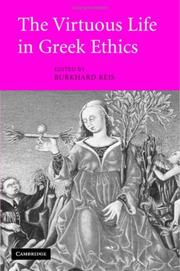
ISBN: 9780521859370 0521859379 9780511482595 9780521125369 9780511226328 0511226322 051122446X 9780511224461 051122513X 9780511225130 051122575X 9780511225758 0511482590 1280567635 9781280567636 1107167337 9781107167339 0511317859 9780511317859 0521125367 Year: 2006 Publisher: Cambridge, UK New York Cambridge University Press
Abstract | Keywords | Export | Availability | Bookmark
 Loading...
Loading...Choose an application
- Reference Manager
- EndNote
- RefWorks (Direct export to RefWorks)
There is now a renewed concern for moral psychology among moral philosophers. Moreover, contemporary philosophers interested in virtue, moral responsibility and moral progress regularly refer to Plato and Aristotle, the two founding fathers of ancient ethics. The book contains eleven chapters by distinguished scholars which showcase current research in Greek ethics. Four deal with Plato, focusing on the Protagoras, Euthydemus, Symposium and Republic, and discussing matters of literary presentation alongside the philosophical content. The four chapters on Aristotle address problems such as the doctrine of the mean, the status of rules, equity and the tension between altruism and egoism in Aristotelian eudaimonism. A contrast to classical Greek ethics is presented by two chapters reconstructing Epicurus' views on the emotions and moral responsibility as well as on moral development. The final chapter on personal identity in Empedocles shows that the concern for moral progress is already palpable in Presocratic philosophy.
General ethics --- Greece --- Virtue. --- Ethics, Ancient. --- Ethics, Modern --- Conduct of life. --- Plato --- Aristotle --- Influence. --- Conduct of life --- Ethics, Ancient --- Virtue --- Ethics --- Human acts --- Ancient ethics --- Ethics, Practical --- Morals --- Personal conduct --- Philosophical counseling --- Aflāṭūn --- Aplaton --- Bolatu --- Platon, --- Platonas --- Platone --- Po-la-tʻu --- Pʻŭllatʻo --- Pʻŭllatʻon --- Pʻuratʻon --- Πλάτων --- אפלטון --- פלאטא --- פלאטאן --- פלאטו --- أفلاطون --- 柏拉圖 --- 플라톤 --- Aristoteles --- Aristote --- Aristotile --- Platon --- Platoon --- Arisṭāṭṭil --- Aristo, --- Aristotel --- Aristotele --- Aristóteles, --- Aristòtil --- Arisṭū --- Arisṭūṭālīs --- Arisutoteresu --- Arystoteles --- Ya-li-shih-to-te --- Ya-li-ssu-to-te --- Yalishiduode --- Yalisiduode --- Ἀριστοτέλης --- Αριστοτέλης --- Аристотел --- ארסטו --- אריםטו --- אריסטו --- אריסטוטלס --- אריסטוטלוס --- אריסטוטליס --- أرسطاطاليس --- أرسططاليس --- أرسطو --- أرسطوطالس --- أرسطوطاليس --- ابن رشد --- اريسطو --- Pseudo Aristotele --- Pseudo-Aristotle --- Платон --- プラトン --- アリストテレス --- Arts and Humanities --- Philosophy --- Ethics, Modern - 20th century. --- Plato - Influence. --- Aristotle - Influence.
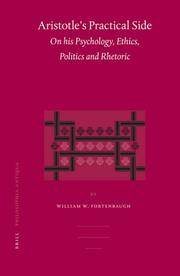
ISSN: 00791687 ISBN: 9004151648 9789004151642 9786611399375 128139937X 9047409752 9789047409755 9781281399373 Year: 2006 Volume: 101 Publisher: Leiden Boston
Abstract | Keywords | Export | Availability | Bookmark
 Loading...
Loading...Choose an application
- Reference Manager
- EndNote
- RefWorks (Direct export to RefWorks)
This volume focuses on Aristotle’s practical philosophy. His analysis of emotional response takes pride of place. It is followed by discussion of his moral psychology: the division of the human soul into emotional and deliberative parts. Moral virtue is studied in relation to emotion, and animals are shown to lack both emotion and virtue. Different kinds of friendship are analyzed, and the effects of vehemence, id est, temperament are given special attention. Aristotle’s justification for assigning natural slaves and women subordinate roles receives detailed consideration. The same is true of his analysis of correct and incorrect constitutions. Finally, persuasion is taken up from several angles including Aristotle’s emphasis on the presentation of character and his curious dismissal of delivery in speech.
Psychology --- Ethics, Ancient --- Rhetoric, Ancient --- Psychologie --- Morale ancienne --- Rhétorique ancienne --- History --- Histoire --- Aristotle. --- Aristotle --- Ethics --- Rhétorique ancienne --- Rhetoric, Ancient. --- Aristoteles --- Aristote --- Aristotile --- Aristoteles. --- Ethics. --- Psychology. --- Arisṭāṭṭil --- Aristo, --- Aristotel --- Aristotele --- Aristóteles, --- Aristòtil --- Arisṭū --- Arisṭūṭālīs --- Arisutoteresu --- Arystoteles --- Ya-li-shih-to-te --- Ya-li-ssu-to-te --- Yalishiduode --- Yalisiduode --- Ἀριστοτέλης --- Αριστοτέλης --- Аристотел --- ארסטו --- אריםטו --- אריסטו --- אריסטוטלס --- אריסטוטלוס --- אריסטוטליס --- أرسطاطاليس --- أرسططاليس --- أرسطو --- أرسطوطالس --- أرسطوطاليس --- ابن رشد --- اريسطو --- Pseudo Aristotele --- Pseudo-Aristotle --- アリストテレス --- Behavioral sciences --- Mental philosophy --- Mind --- Science, Mental --- Human biology --- Philosophy --- Soul --- Mental health --- Industries --- Arisṭ --- Nicomachean ethics (Aristotle) --- Rhetoric (Aristotle) --- Retorica (Aristotle) --- On rhetoric (Aristotle) --- Grylus (Aristotle) --- Rhetorica (Aristoteles) --- Rhetorica (Aristotle) --- De arte rhetorica libri tres (Aristotle) --- Aristotelis Stagyritae De arte rhetorica libri tres (Aristotle) --- Ethica Nicomachea (Aristotle) --- Sefer ha-midot ʻal-shem Niḳomakhus (Aristotle) --- Aristotelis Ethica Nicomachea (Aristotle) --- Aristotle - Psychology --- Aristotle - Nicomachean ethics --- Aristotle. - Rhetoric --- Aristotle - Ethics
| Listing 1 - 10 of 22 | << page >> |
Sort by
|

 Search
Search Feedback
Feedback About UniCat
About UniCat  Help
Help News
News